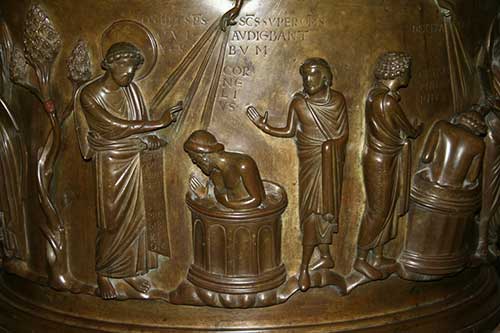
Sunday. last week, Paul told us all:
it has been reported to me by Chloe’s people that there are quarrels among you, my brothers and sisters. What I mean is that each of you says, ‘I belong to Paul’, or ‘I belong to Apollos’, or ‘I belong to Cephas’, or ‘I belong to Christ.’ Has Christ been divided? Was Paul crucified for you? Or were you baptized in the name of Paul? I thank God that I baptized none of you except Crispus and Gaius, so that no one can say that you were baptized in my name.
From 1 Corinthians 1:10-18
Before proceeding, let me stress (as I have previously) I am NOT advocating an abandonment of the baptismal agreements within and between denominations. Also, I understand the conviction that many Christians have that God’s Spirit is at work in development and changes in doctrine and practice.
BUT I have, from examining New Testament and Early Church descriptions of baptisms, long contended that in the early church, baptism regularly didn’t use “in the name of” as a verbalised formula or declaration. Reading our current practice back into those early texts is anachronistic and mistaken.
We can, even nowadays, understand an action being ‘in the name of’ someone without the words “in the name of” being said aloud. A recent example: the ceremony Governor General Cindy Kiro appointed Chris Hopkins as New Zealand’s 41st Prime Minister in the name of King Charles III. But the exact words “in the name of” were not used.
Baptism, in the New Testament, is in the name of God, in the name of Christ – on behalf of God, of Christ. But, I contend, this was not understood as saying “…in the name of …” aloud. This explains the SEEMINGLY-conflicting New Testament accounts:
Go therefore and make disciples of all nations, baptizing them in the name of the Father and of the Son and of the Holy Spirit – Matthew 28:19
Peter said to them, ‘Repent, and be baptized every one of you in the name of Jesus Christ – Acts 2;38 (and Acts 10:48)
they had only been baptized in the name of the Lord Jesus – Acts 8:16 (and Acts 19:5)
What is underscored in the Letter to the Corinthians is that if Paul (quoted above), when baptising, verbalised “…in the Name of the Father…” or even “…in the Name of Jesus…” there would have been no suggestion that Paul baptised “in the name of Paul”. At the time of Paul, baptism was an action – the words, if any, accompanying that action were not essential to the action. That is why Paul feared that baptisms by him could be interpreted to be “in Paul’s name”.
As well as “in the name of” being understood as “on behalf of”, there is also the strong biblical understanding of Name as being “into the nature of”.
Read further:
Baptised In Paul’s Name (Part 1)
Baptised In Paul’s Name (Part 2)
How To Baptise?
Baptism In The Name Of The Lord Jesus
To conclude: I stress again – just as, if I were writing a Eucharistic Prayer nowadays I would include an account of Jesus’ last meal (whilst scholarship indicates this has not been present as a requirement in every such consecrating prayer from the early church – and, in fact, is absent from at least one consecrating Eucharistic Prayer still used), similarly I advocate for the use of baptising with a said-aloud formula “…in the Name of the Father, and of the Son, and of the Holy Spirit” whilst holding that there are valid baptisms that have not used such a formula.


